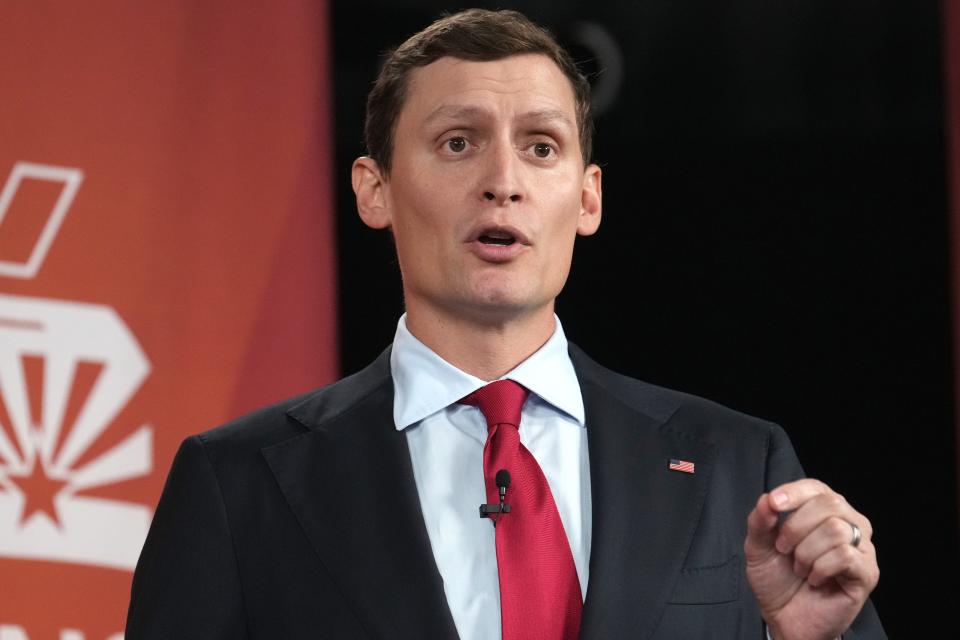8th Congressional District candidates lean further right in GOP primary debate
It lacked the combativeness of past candidate forums but a televised debate Tuesday showed how the West Valley's next member of Congress may lean further to the right than the exiting incumbent.
The Republican race in Arizona's 8th Congressional District has become one of the state's most bitter primary contests, pitting former campaign allies against each other and revealing growing disagreement within the GOP about how to govern.
But unlike in their previous debates and campaign trail messaging, the candidates largely passed on opportunities to attack each other. Instead, several of them spelled out conservative views that would position them further to the right — at least in rhetorical flair — than the outgoing Rep. Debbie Lesko, R-Ariz.
Twice during the debate, former U.S. Senate candidate Blake Masters called illegal immigration a “cancer.”
"Illegal immigration is a cancer. I think cancer is actually the right metaphor for it," Masters, a venture capitalist, said.
“What happens if you don't do anything? The cancer grows. It metastasizes. And then you die."

His language echoed a 20th-century Nazi trope that likened certain ethnic groups to a disease of the body politic. Propaganda posters compared Jews to “lice” and spread the falsehood that Jews caused outbreaks of typhus.
“In his effects and consequences he is like a racial tuberculosis of the nations,” Adolf Hitler once wrote of the Jewish people.
Masters was the only participating candidate who did not take questions from the media after the debate. He did not immediately return a written request for comment.
Lesko has been a strong supporter of former President Donald Trump but has taken a more diplomatic approach in her rhetoric and political style than some of her like-minded peers.
Lesko has consistently used hardline or militarized rhetoric regarding immigration, like describing the situation as an "invasion," but has stopped short of the most extreme positions heard on the right.
Masters, whose fundraising has been boosted by a multimillion-dollar personal loan, is widely seen as one of the frontrunners in the race. Another is Abe Hamadeh, a former Arizona attorney general candidate who has secured former President Donald Trump’s endorsement.
Hamadeh for his part stuck to familiar positions that matched Trump’s platform on top conservative issues. Deploying Trump’s vocabulary he called members of drug cartels “very nasty people” and called for migrant deportations.
Taking questions after the debate, Hamadeh differentiated himself from his rivals by saying that it was “premature” to ask whether he would accept the result of the ongoing primary. The other candidates interviewed — including state Sen. Anthony Kern, Arizona House Speaker Ben Toma and political newcomer Patrick “Pat” Briody — all said they would accept the result.
"If they get our elections fixed, then maybe. But right now there's been no accountability,” Hamadeh said.
Toma, R-Glendale, who Lesko has endorsed, took a more measured position on the topic. He said “of course” he would accept the election result and said that some Republican-led conspiracy theories about U.S. election security have turned out to be wrong.
"After the 2020 election, I was the only one, again, here that actually went down ... and looked at some of these theories."

"Many of them turned out to be just flat out wrong: theories about how ballots were counted, or whatever," he said.
During the debate, Kern, R-Glendale, who was recently indicted as one of Arizona’s fake electors, talked about how he has had multiple law enforcement agencies “at my door.”
“It’s not easy being in that situation,” Kern said, but “I am honored to be that person that is a target of the FBI, the DOJ, and the (state) Attorney General, just as Trump is.”
He declined to elaborate on his involvement with the DOJ.
Briody kept a low profile during the debate, outlining conservative policy positions. He nodded to his standing in the race in a post-debate interview.
"I was polling at 3% at one point. I was at zero for the longest time. You know, no one knows me,” he said.
Every candidate but former U.S. Rep. Trent Franks, R-Ariz., was in attendance.
In an email to the debate host, the publicly funded Citizens Clean Elections Commission, Franks said he declined the invitation out of a principled objection against "taxpayer funding of political campaigns."
He acknowledged that the organization is not funding any of the congressional campaigns. "However, having been in the public policy arena for significant period of time, it has always been my observation that even indirect government funding brings opportunity for government interference, control, or corruption. As it is said, 'With shekels come shackles,'" Franks wrote, according to a copy of the email his campaign shared with The Arizona Republic.
"There (is) certainly no doubt in my mind that, politically it would have been wiser for me to attend the debate. But over the years, I have learned to try to stick to what I truly believe are important principles for the long run even though they might seem benign in the short run."
By sitting out the televised forum, Franks also may have avoided the risks of an unscripted media appearance. In a previous debate, a moderator asked Franks about the sexual-harassment scandal that caused him to resign from Congress in 2017. Franks apologized and said he regrets his behavior.
Laura Gersony covers national politics for the Arizona Republic. Contact her at 480-372-0389.
This article originally appeared on Arizona Republic: Who replaces Debbie Lesko? GOP CD8 primary becomes bitter contest
